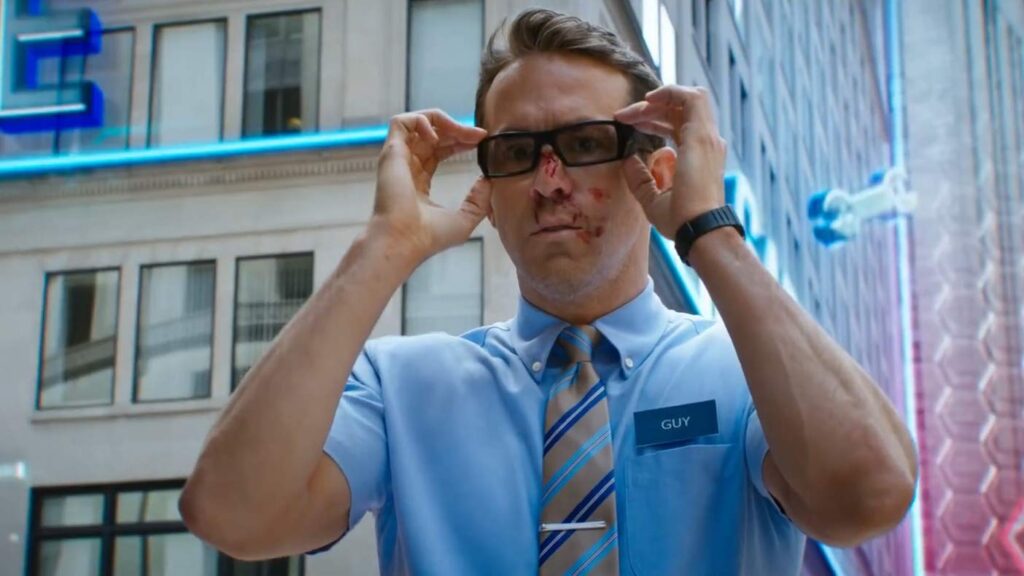
Once you acknowledge that it’s creatively bankrupt, Free Guy becomes a reasonably diverting time at the movies. It’s a work of benevolent fraud, like an identity thief who steals your credit card and then buys you some cool shit before jetting off to Cancun. It’s also a fascinating document for where it sits in today’s precarious blockbuster landscape: a big-budget original screenplay that nonetheless feels awkwardly bootstrapped to the superior pictures it’s imitating. It’s an original copy—an organic movie with a synthetic soul.
Free Guy was technically directed by the journeyman Shawn Levy (Night at the Museum, Real Steel), but its true authorship is corporate. It’s being distributed under the banner of “20th Century Studios”, which means it was initially developed at Fox before that company was acquired by Disney, the insatiable commercial behemoth that currently owns roughly 98% of the market share. The film’s first trailer, which premiered back during the Before Times of December 2019, winkingly ridiculed the Mouse House’s penchant for recycling old hits (“from the studio that brought you Beauty and the Beast, Aladdin, and The Lion King… twice”), but Free Guy occupies a curious double-zone; even as it’s trumpeting its original bona fides at every turn, it’s continually leveraging its preexisting brand in the hope of launching yet another merchandise-friendly franchise.
Forget metaphors; the movie literally takes place in multiple worlds. One is Free City, and if you can somehow experience its introduction cold, it’s rather brilliant. Guy (Ryan Reynolds) is a bank teller with a cheerful disposition whose daily routine—a merry ritual of dressing, commuting, and coffee-buying—recalls the amiable monotony of Chris Pratt’s regular schmo in The LEGO Movie. Yet while Guy is persistently untroubled, the metropolis around him is clearly engulfed in pandemonium, a constant cacophony of crashes, deaths, and explosions. All of this carnage plays out in the background; the camera remains focused on Guy, who isn’t oblivious to the chaos so much as unfazed by it. When the proprietor of his local bodega gets thrown through his storefront window, Guy yanks him to his feet and greets him with a casual, “Mondays, amirite?”
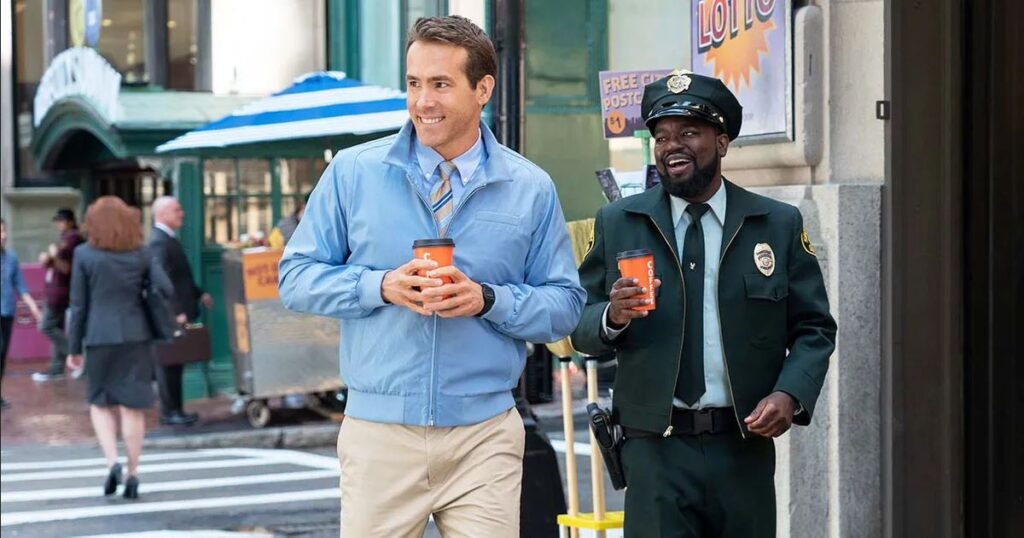
This is all very fun, even if the ensuing reveal is predictable and somewhat deflating. Free City isn’t a real place; it’s the titular virtual realm of a role-playing videogame not unlike Grand Theft Auto, where players can customize avatars (or “skins”, in the film’s parlance), interact with other users, and embark on dangerous missions, such as robbing the bank where Guy works. This means that Guy himself isn’t a person but a “non-player character”, or NPC—a computer-coded ornament intended to increase the game’s realism quotient, and to serve as cannon fodder for the paying customers. (In a clever touch, the designers distinguish “real” players from NPCs by bestowing sunglasses on the former.) NPCs aren’t meant to question their role in this meticulously curated universe—they’re not, y’know, human—yet one day, after hearing a sunglassed babe humming a Mariah Carey tune, Guy starts to deviate from his programming. (The scene where he attempts to switch his usual coffee order to a cappuccino, nearly causing his barista to short-circuit, is a cute piece of restrained but detailed world-building.) Before long, he’s in the thick of a crisis that’s literally existential, racing to protect his home from digital destruction.
Despite arising from a nominally original screenplay (by Matt Lieberman and Zak Penn), this is hardly the most novel conceit; it immediately brings to mind The Truman Show, The Matrix, Wreck-It Ralph, the aforementioned LEGO Movie, the Jumanji remake, Ready Player One, and a host of others. That doesn’t automatically make Free Guy hollow; no movie exists in a vacuum, and there’s nothing inherently wrong with drawing inspiration from other films. What grates about it is that it’s a product of obvious pastiche that nonetheless flaunts its supposed originality.
I don’t mean this figuratively. There’s an actual scene where Free City’s chief architect, Antwan (an irritating Taika Waititi), delivers a speech venerating the concept of sequels, and explains how the most valuable property in the entertainment industry is the intellectual kind. Arrayed against him is a pair of scrappy developers, Millie (Killing Eve’s Jodie Comer) and Keys (Stranger Things’ Joe Keery), who pine for the humanism of Life Itself, the more tranquil game they previously created that prioritized the growth of its artificial characters rather than Free City’s perpetual violence and havoc. The central ideological conflict of Free Guy is between these two sets of philosophically opposed visionaries; Millie and Keys are the scrappy heroes, true artists fighting against the venal Antwan, who eagerly sacrifices innovation at the altar of corporate greed.
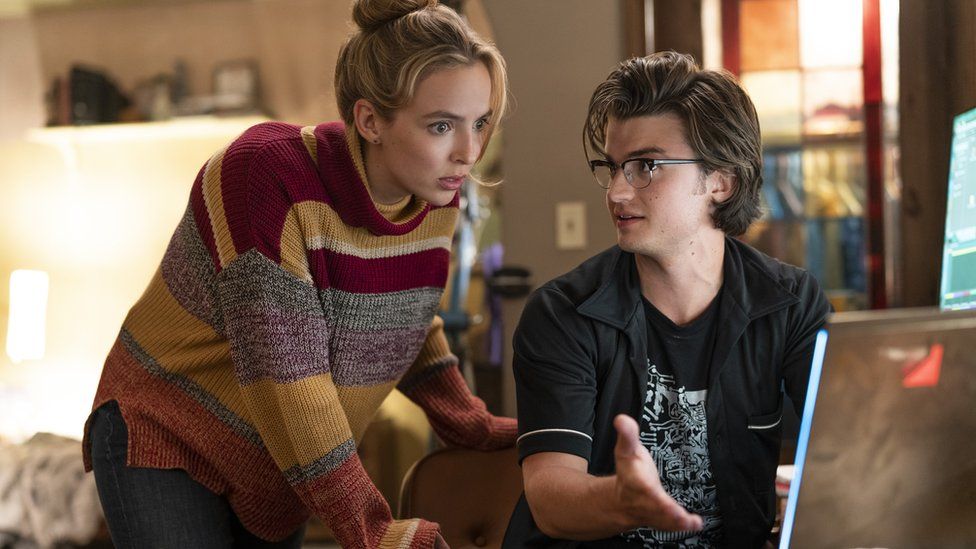
Yet while the screenplay clearly expects us to root for the upstarts, it’s hard not to sense Antwan’s ruthless commercial instincts guiding its hand. The single funniest joke in Free Guy is a cameo from a Marvel Cinematic Universe icon—a sly piece of cross-promotion only made possible because both franchises operate under Disney’s massive umbrella. That’s followed by the crowd-pleasing appearance of a certain intergalactic weapon, whose distinctive whoosh incorporates yet another mega-property into the mix. It isn’t as though Free Guy is bereft of its own ideas—it features some witty lines and some clever images—but despite pretending to champion creative independence, at its core it’s defending something more insidious: cinematic monopoly.
But maybe I’m taking things too seriously. After all, any Ryan Reynolds vehicle demands that you approach it with snarky detachment rather than rigorous inquiry. So forget Free Guy’s squishy themes and self-satisfied rhetoric; does it work as a playful action comedy? Well, sometimes. Reynolds is often accused of doing the same old shtick, but his oblivious Guy is far sweeter and sunnier than his wisecracking Wade Wilson from the Deadpool films, and most of the scenes that unfold within the cyber world of Free City have a pleasant and perky quality. Levy’s action choreography can feel plasticky, but that’s appropriate for this intentionally unnatural universe, and a few sequences—as when Guy attempts to escape from two determined hunters, or when he repeatedly seeks to foil the same armed robbery, Edge of Tomorrow-style—develop actual momentum. Reynolds also evinces a gentle chemistry with Comer, who pulls double duty as Millie’s skin, Molotov, stalking through the simulated streets in search of a MacGuffin while sporting a (real) British accent, a chic brown dye job, and some indecently tight leather pants. The flickers of romance that bloom between Guy and Molotov are completely absurd yet also oddly touching, culminating in a beautiful scene that lends this smirky blockbuster some classical rom-com tenderness.
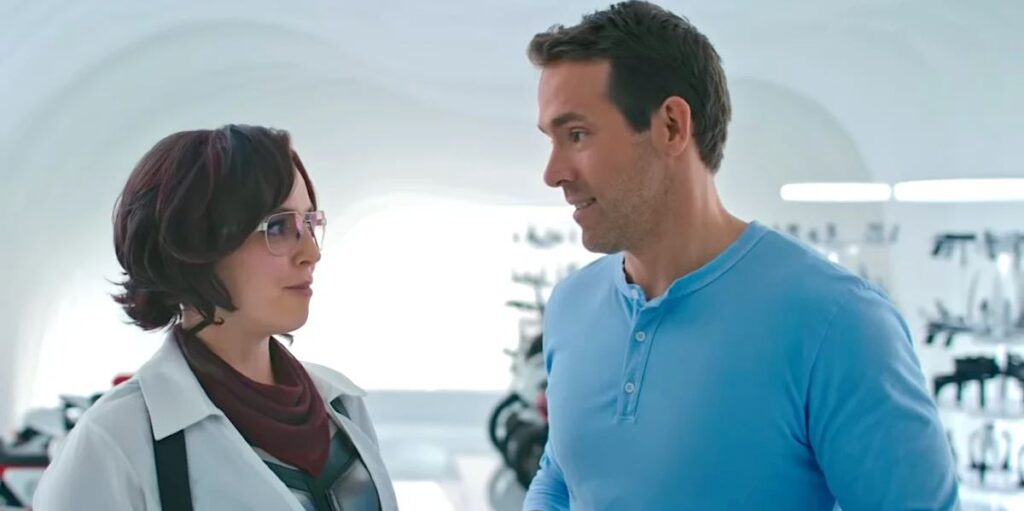
Free City is such a neat place to hang out, it’s baffling that the movie spends so much time in the banal offices of Soonami, the development company where Antwan and Keys bicker over programming code and engage in corporate espionage. Waititi is an agile comedian, but his exaggerated antics are a poor fit here, and the scenes where he snarls at Keys or bullies a subordinate (Utkarsh Ambudkar) are just a drag. In general, the film’s storytelling is clumsy; the screenplay repeatedly conveys crucial information through video messages rather than conversation, and it mounts laborious efforts to integrate its real and false worlds in ways that make virtually no sense.
Perhaps that’s a churlish complaint, but Free Guy is so invested in explaining how its technology works, it practically demands meddlesome scrutiny. Yet try to parse it, and your head starts to hurt. For example, there’s a scene where Molotov vaults onto Guy’s motorcycle and straddles him, then asks, “Is that a Glock in your pocket?” (His response: “No… it’s two Glocks.”) That’s reasonably funny, but remember, Molotov isn’t a person, she’s just Millie’s avatar. So how does Millie sense a gun in Guy’s pants while playing the game? Does her controller vibrate? Does her monitor blare a message that reads, “Unknown Object Detected”? These are undeniably stupid questions, but the movie forces you to ask them.
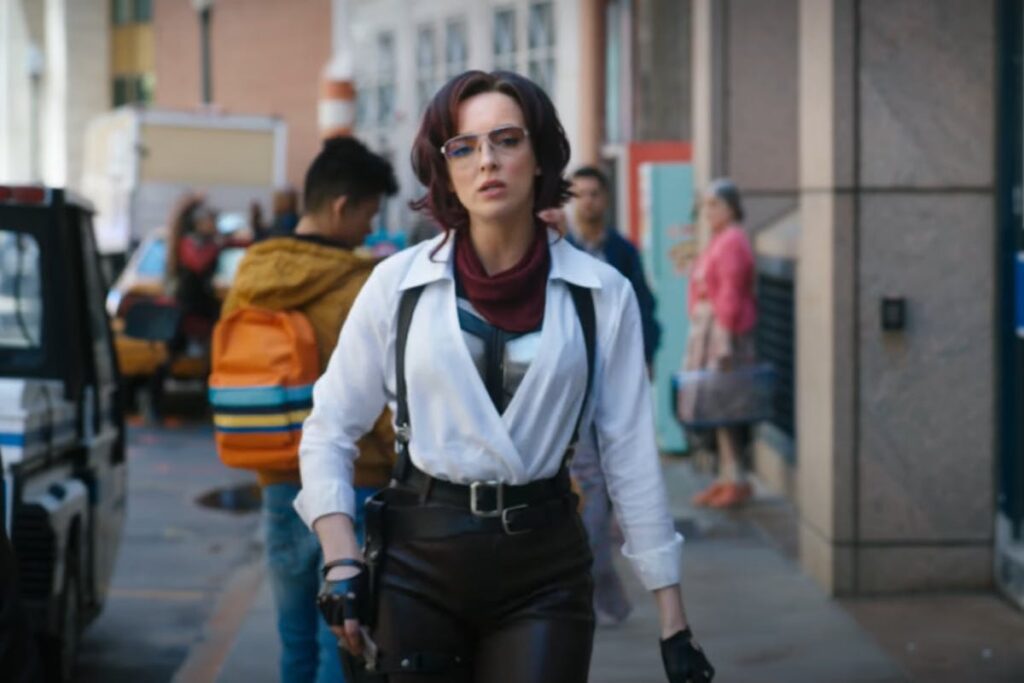
That’s why Free Guy works best when you—and I shudder to write this phrase—turn your brain off and just bask in its sea of temperate silliness. Yet even here, the comedy is uneven. To be fair, there’s a very funny joke about gun violence, a pretty funny joke about catchphrases, and a mildly amusing joke about how certain sects of the gaming population are prone to telling horribly offensive jokes. Lil Rey Howery gets to shriek in yet another movie that fails to exploit his charisma (Judas and the Black Messiah remains the happy exception), while Channing Tatum pops up for a dreadful scene in an armory that flails around in want of a laugh. There’s a wry Meet Joe Black reference, an obvious Miley Cyrus needle drop, and a cameo from Alex Trebek. It’s all enjoyable enough, so long as you don’t stop and think about it.
The irony, of course, is that Free Guy very much wants you to think about it, so long as your thoughts are appreciative of its wit and invention. And here, like that helpless barista caught in a loop, I feel the need to reboot my system. The more I think about Free Guy, the less convinced I am that it’s a good movie; at the same time, any movie that makes me think about it as much as this one can’t be entirely disregarded. But who cares what I think? The sobering lesson of Free Guy is that its success is axiomatic. It’s an original screenplay that both mocks and leverages the intellectual property of its maker. What kind of grump can’t admire that? Guy might be battling for a more just and self-determined universe, but the real war is already over. This is Disney’s world. The rest of us are just NPCs.
Grade: C+
Jeremy Beck is the editor-in-chief of MovieManifesto. He watches more movies and television than he probably should.
